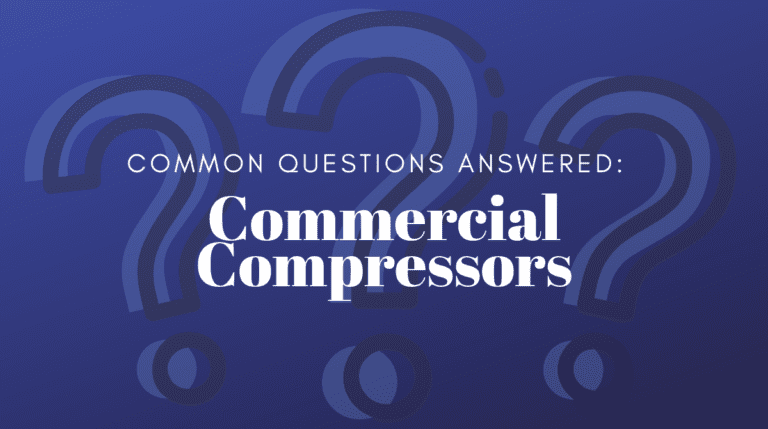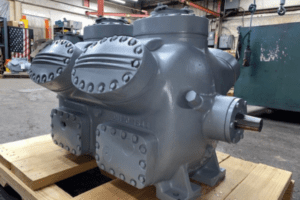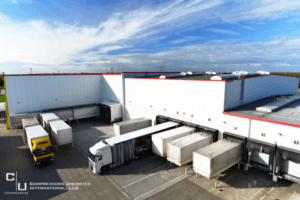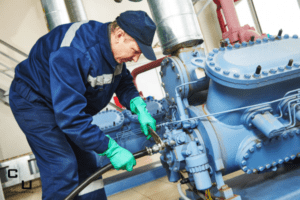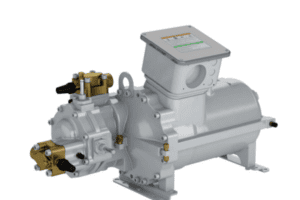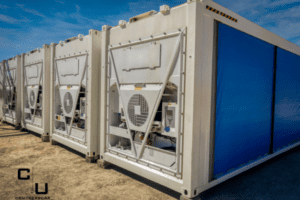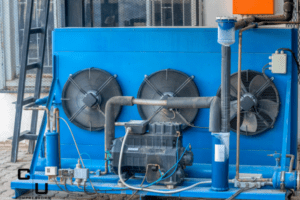What are the Types of Compressors Used in HVAC Systems?
There are five types of HVAC compressors. Here are the five types of compressors used in HVAC systems and their applications.
- Reciprocating Compressors: You find these compressors in electrical appliances, refrigeration units, residential A/Cs, industrial machines, light commercial, and commercial A/C units.
- Rotary Compressors: You can find these compressors in appliances and residential A/C units.
- Scroll Compressors: You can find these compressors in residential A/Cs, refrigeration units, industrial machines, light commercial and commercial A/Cs.
- Screw Compressors: These compressors can support industrial applications, refrigeration units, and commercial A/Cs.
- Centrifugal Compressors: You can find these compressors in commercial A/C units.
Why Do Commercial HVAC Compressors Fail?
Commercial HVAC compressors ideally last for many years. Factors like maintenance schedules and working conditions affect the life of your compressor.
Here are a few leading causes of commercial HVAC compressor failure.
Low Refrigerant: Over time, your compressor may develop tiny leaks. You may not notice the refrigerant escaping, but the levels drop over time. If not corrected, the compressor may wear itself out until the point when it can no longer move air. To avoid this kind of failure, check and refill your refrigerant.
Bad Refrigerant Refiling: HVAC refrigerants are complex. Do not try to refill yourself. Consult a qualified HVAC professional. Refrigerants vary in weight, compression rates, and lubrication properties. A refill with the wrong type of refrigerant may mean disaster. Your compressor may lose efficiency or fail. The result could be worse when you mix different kinds of refrigerants.
Dirty Coils: Accumulating dust may inhibit coil efficiency. Dust insulates the coils and prevents heat transfer from the unit. Trapped heat is taxing to the compressor. The compressor works harder to cycle the refrigerant faster. The harder the compressor runs, the more it heats up. Eventually, the compressor may suffer failure.
Bad Suction Lines: Suction lines control how much pressure that builds on either side of the compressor. Leaking suction lines could lead to the loss of the refrigerant. The consequence is low-pressure spots within the compressor. The blockage of suction lines could lead to excessive pressure build-up on either side of the system. The difference in pressure could cause your commercial compressor to overheat. If not corrected, failure is imminent. A qualified HVAC technician knows how to determine the right size of suction lines. Always consult one to carry out this type of maintenance.
Low Oil Levels: Commercial compressors use the oil in their system to clean, lubricate, and cool the machine. When your oil levels are running low, the moving parts within the system suffer friction and wear. Tiny bits of metal break-off the cogs and gears. The debris may cause a blockage within the oil lines. Friction between moving parts may cause overheating and later, failure. Check your oil levels and refill regularly. Watch out for leaks.
Why Do Compressors Ice-Up?
In rare cases, you may experience a layer of ice forming over the surface of your compressor. Compressor icing could be due to a low refrigerant charge, a dirty filter, or a blocked evaporator.
When you notice icing on your compressor, turn off the cooling element of the A/C. Place a fan at the position of the thermostat. The fan melts the ice without impacting damage onto the compressor.
A frozen compressor could mean a frozen indoor coil. Both elements will need complete de-icing be anyone can make a diagnosis. Contact a qualified technician to diagnose the problem.
Why Choose Remanufactured Compressors
A remanufactured compressor is one that has undergone a complete transformation. The old components go through thorough cleaning, and the worn-out parts get a replacement.
The technology in the old compressor gets a complete upgrade to the new standards. With remanufactured compressors, you get to avoid the friction and excessive heat that often come with rebuilt compressors.
Since remanufactured compressors benefit from a technological upgrade, they are more energy-efficient than the old version. All the mechanical tolerances get an update to current OEM standards.
The quality of the final product depends on the remanufacturing process. At Compressors Unlimited, we developed a unique process that guarantees the quality of our remanufactured compressors. Check out details on our remanufacturing process. Our technicians use the appropriate product data sheets to determine the proper tolerances, torque, and specification. Additionally, every compressor that is remanufactured by Compressors Unlimited is run tested before it is released into inventory.
There you have it, every answer to the most common questions around commercial HVAC compressors.

